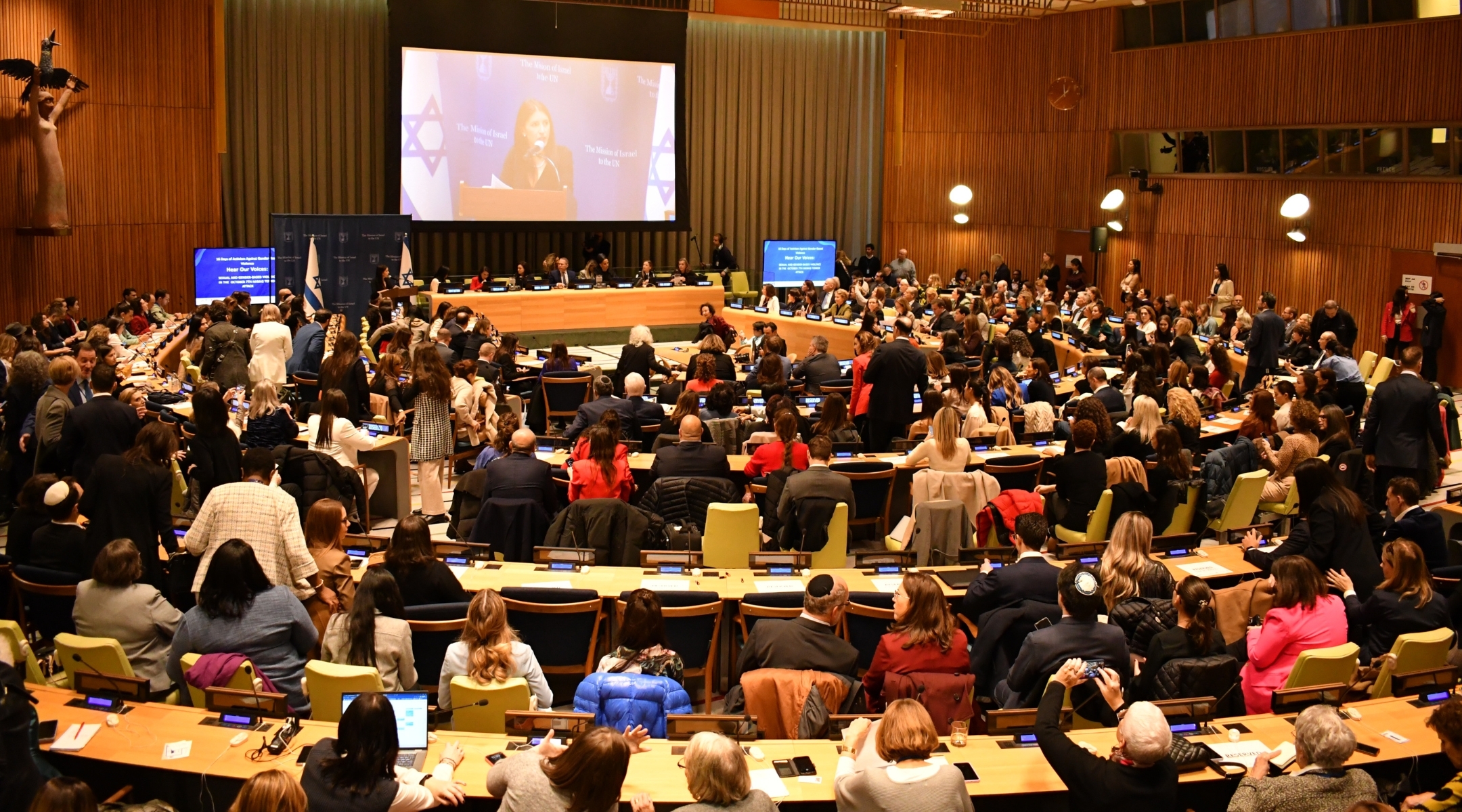UN report validates ‘clear and convincing’ allegations of Hamas sexual violence
Israel’s foreign minister recalled his U.N. ambassador, saying the body was not doing enough to expose the atrocities

The United Nations on Dec. 4 held a special session on sexual violence committed by Hamas during the terror attacks on Oct. 7 (Jackie Hajdenberg)
(JTA) — A United Nations report validated Israeli reports of sexual violence committed by Hamas during its Oct. 7 invasion of Israel and afterward, including instances of rape.
The 24-page report, based on a 17-day investigation spanning January and February, supports a claim that Israel and its supporters have stressed in the months since Oct. 7: that rape and sexual assault were part and parcel of the atrocities committed by Hamas that day, and suffered later by the hostages it took to Gaza.
But the report has also angered the Israeli government, which has accused the U.N. of seeking to bury the report and has recalled its U.N. ambassador in protest.
The report, compiled by a team led by Special Representative Pramila Patten, was written based on dozens of interviews, visits to the sites of Oct. 7 massacres and consultations with Israeli investigative and law enforcement bodies. Although the investigative team did not speak to any survivors of sexual violence, it concluded in graphic terms that such violence had occurred or, in the case of hostages, may be ongoing. The report said that there were reasonable or verified claims of rape or gang rape in at least three places.
“[T]here are reasonable grounds to believe that conflict-related sexual violence occurred during the 7 October attacks in multiple locations across Gaza periphery,” the report said. “Across the various locations of the 7 October attacks, the mission team found that several fully naked or partially naked bodies from the waist down were recovered — mostly women — with hands tied and shot multiple times, often in the head.”
The report added that, in terms of the more than 250 hostages taken to Gaza, there is “clear and convincing information that some have been subjected to various forms of conflict-related sexual violence including rape and sexualized torture and sexualized cruel, inhuman and degrading treatment and it also has reasonable grounds to believe that such violence may be ongoing.”
The report’s conclusions accord with allegations advanced by Israel and many of its supporters in the nearly five months since Oct. 7. Jewish women’s groups in particular have castigated women’s rights organizations for ignoring or downplaying reports of sexual violence on Oct. 7. Sheryl Sandberg, the former Meta COO, was a keynote speaker at an event organized. by the Israeli mission to press for consequences for the violence.
Some pro-Palestinian activists have denied that widespread sexual violence occurred. A lengthy New York Times report detailing allegations of sexual violence on Oct. 7 has also come under scrutiny.
But Israeli Foreign Minister Israel Katz reacted to the report’s publication with outrage, writing on X, formerly Twitter, that he had recalled Israeli U.N. Ambassador Gilad Erdan for immediate consultations over how the report was handled.
Katz accused U.N. officials of “an attempt to silence the severe U.N. report about the mass rapes that were carried out by Hamas and its abettors on Oct. 7.”
Katz took aim at U.N. Secretary-General Antonio Guterres, writing, “Although he has the authority to do so, the U.N. secretary general has not convened the Security Council to declare Hamas a terrorist group and to place sanctions on its supporters.”
Erdan also criticized the report, writing on X, “It took the United Nations five months to finally recognize the sexual crimes committed on October 7th during Hamas’ massacre.”
A U.N. spokesman denied that Guterres sought to obscure the report. “In no way, shape or form did the Secretary-General do anything to keep the report ‘quiet,’” Stephane Dujarric was quoted as saying by Reuters. “In fact, the report is being presented publicly today.”
The report described the difficulties Patten’s team faced during its inquiry, including the mutilation of some of the corpses and the difficulties of forensic teams in gathering evidence in the aftermath of the attacks. She also described distrust among victims toward international bodies including the U.N., which is widely regarded as antagonistic in Israeli society. Patten wrote that the team learned of a “small number of survivors” who are “still experiencing an overwhelming level of trauma.”
Hadassah, the women’s Zionist movement, said the report fell short in at least one respect: in Patten’s recommendation that U.N. bodies with a history of acting adversarially toward Israel further investigate the charges.
“It is outrageous to hear UN officials suggest the Commission of Inquiry [on occupied Palestinian territory, including east Jerusalem and Israel], a body comprised of individuals with a clear track record of antisemitism and anti-Israel bias, should be the agency to conduct a formal investigation into these crimes,” said Carol Ann Schwartz, Hadassah’s president, in a release.
This article originally appeared on JTA.org.















